
Who is the Best of the New Boys?
Atlas F1 GP Correspondent
The European Grand Prix marked the half point of the 2002 season. After nine races some of this year's rookies are tipped to be future champions, while for other it could be their first and last compaign in the pinnacle of motor sport. Atlas F1's correspondent Will Gray reviews the season of the new boys so far
Their ages ranged from the young (Brazilian Felipe Massa, who was just 20 when he arrived at Sauber) to the old (Scot Allan McNish, a lively 32-year-old in his first season with Toyota) with a pair sat in the middle at 25 (Australian Mark Webber, with Minardi, and Japan's Takuma Sato, at Jordan).
All have made their way to the top from different directions, but perhaps the most interesting is Allan McNish, who tested for McLaren when he was Massa's age but was forced into sportscar racing before his long association with Toyota gave him a route to Formula One. "We just want to qualify," he said of his ambitions at the opening race.
Massa, on the other hand, has been given his break early after being plucked from relative obscurity after a few seasons in the lower formulae. But his task was made even more challenging by the fact that he followed in the direct footsteps of Finnish sensation Kimi Raikkonen, who finished tenth in the 2001 World Championship after making his debut with just 23 races under his belt.
Team boss Peter Sauber did much to calm the excitement of his new little gold mine, saying at the time: "It is difficult for him and I think it is also difficult for the team because last year with Kimi it was a risk and we took the risk. But I am really happy because the pressure on him is so big and he didn't make a big mistake when he started."
Placed in a car that would be capable of points-scoring positions, and possibly even a podium, Massa was more aggressive than McNish in his ambitions, but remained carefully confident. "I feel happy with this team," he said. "I am just a young guy finding my own way but if I can emulate my idols, Michael Schumacher and Jacques Villeneuve, one day I will be happy."
"I will be World Champion," he firmly told Atlas F1 in one of his first exclusive interviews after Eddie Jordan signed him up to be part of his Honda-powered team. The Japanese driver, who had lived in Britain for many years, secured his drive with a domination of British Formula Three and his energetic team boss, often known as a talented talent spotter, was confident that Sato could be good to his word.
But it was Webber who was the first of the four to make his mark. The understated Aussie, who finished runner-up in the previous year's Formula 3000 championship and had promised to just "do my best" for the under funded back-of-the-grid Minardi team, stunned his home crowd with a fifth place debut finish.
While wannabe champion Sato failed to qualify and was only allowed into the opening race on a plea from his team, Webber claimed 18th spot on the grid and raced to an historic personal victory which saw him and his countryman team boss Paul Stoddart dancing on the podium in an impromptu celebration.
It was a strong contrast to his rival debutants as McNish and Massa both crashed out and Sato failed to finish because of electrical problems that struck his Jordan after he started from the back. But for Webber, it was to be his best day so far and, with development of his car now dried up because of a lack of money, most likely his best of the season.
Yoong, however, is not exactly a racer that can be seen to have the calibre of any of the other rookies' teammates and Stoddart openly admits the Malaysian is in the car because he brings in vital money from his home country. Clearly, on pace, Yoong cannot be compared to Giancarlo Fisichella, Mika Salo, or Nick Heidfeld, the respective teammates of Sato, McNish and Massa.
But still, Webber is one of the success stories of the season so far considering his high finishing rate (seven out of eight races) and his ability to put the Minardi in places on the track where it should not really be, with performances that have seen him often ahead of the Jaguars and even faster than British American Racing Hondas in some places.
But Webber's opening season in Grand Prix racing has been more about chasing money than chasing points, with his cash-strapped Minardi team struggling to keep afloat. And in an exclusive Atlas F1 interview after the Monaco Grand Prix, he revealed his thoughts on his opening few races.
"I still think what I have done since Australia has been really good," he said. "It was always going to be less exciting, but we have had some good strong races for what we've got and things are going well - it is always difficult to judge what I am driving."
He was on form at the Nurburgring after watching his beloved Brazilian football team storm to a 2-1 victory against England before Friday practice, and his own latest score came two days later, when he managed to net sixth place. He feels he has done rather well.
"I think it is not so bad," he said. "This is a difficult year for the Championship. There are a lot of teams that have improved a lot, particularly Renault, but I am quite happy. I have done nine races and I have four points, and so all the time I try to improve a bit. I think the amount of points is more than I had expected, but we always want more."
Massa outqualified Heidfeld in Melbourne to display his talent from the off but he has faded away in the single lap challenge and is now seven to two down on the German. Still, he remains confident that even though he is yet to get the best out of the car in qualifying, his racing abilities will allow him to chase more points in the second half of the season.
"More points, all the time, more points," he said when asked what his aims are for the remaining eight races. "My teammate has five points and I have four. I think it is not a big difference. I always push and want to do my best, but we also have to see about my car, so some races were really good and some were not so good.
"It is a really nice team here, I am really happy to be here, and I try to improve myself all the time. I already know how to work with the engineers and everybody, but for sure it is a lot of work."
Massa is certainly not buckling under the weight of expectation on his shoulders, and although it seems rookie rival Sato has currently crashed his way into Formula One, making little mark other than the ones he has created on the barriers and tyre walls around the first nine circuits, he too, according to his team, is coping with the pressure very well.
Out of the four rookies, he and McNish are yet to score points and although Sato's race crashes are on a level with all his rookie rivals, with the exception of Webber (who, incidentally, has not crashed out of a single race this year), his practice and qualifying mistakes must have topped the overall tables so far.
Team boss Eddie Jordan remains wholly behind the diminutive Japanese driver, calling for everybody in the team and the media to "give him time" to calm down, and Sato remains confident that he will be able to do the job in the end, even though he admits he finds it tough to ditch his "maximum attack" philosophy.
"Obviously the people want to fight at the beginning and it is quite difficult," he said. "Especially as there are new circuits where I do not have any experience. The car is unbalanced a lot on the practice day and that makes it a little bit more difficult to learn."
Scot McNish, meanwhile, is facing an even more difficult scenario. He is closing in on his teammate Salo in terms of comparative performance, but he has been outqualified by him in every one of the nine races, outfinished by five races to four, and outscored by two points to nil.
He is doing a competent job, but mistakes like the one which sent him out of a promising position in the Monaco Grand Prix, when he crashed into the tyre barrier at St. Devote without any pressure from his rivals, will do him few favours when it comes to fending off big name signings when Toyota begin their build-up to shoot for the big time in 2004.
Names like Eddie Irvine and Jacques Villeneuve, both possible targets for the Germany-based team, are sure to sell cars better than Allan McNish, and although team boss Ove Andersson knows the Scot has a tough challenge to compete with Salo, he has already warned McNish he must up his game.
"I hope he will be able to," said Andersson when asked if McNish needs to boost his performance. "But we also have to up our game. He hasn't been particularly lucky but I think he has done a good job for us. I guess it has been tough for him. We are new in Formula One and he is new as well, so it is not easy because we can't really help him very much.
"If he came into a team with a lot of experience in Formula One they could probably help him more. We are in a situation where we have to rely on the drivers helping us and from the outside, from what I can see, it seems they are working well together."
"Personally I've been pretty pleased with the way things have gone," McNish defended, before pointing rather unadvisedly to his performance relative to his teammate Salo. "Mika has been very strong all year, he has never really made a mistake and he has never really had a bad situation. In the race condition I have been very strong, I've been quicker in some occasions. In qualifying I'm there or thereabouts like we saw in Monaco and in the last few Grands Prix."
It has been tough for the amiable McNish, who has not been suckered in by the Formula One environment and remains as approachable as ever in any paddock. Toyota's points-scoring debut boosted the team and gave them some high aspirations for the rest of the season.
But they have lost their way a little bit in recent times. Both drivers failed to finish in Monaco and Canada, and although there was a slight return to form at the European Grand Prix, there was little to smile about after the race. McNish's results have been made to look a lot less impressive than they should because of two crashes on the first lap of two of the first three fly-away races, and he believes the opportunity may be there to push forward in the latter half of the year.
"We've had some good races and some bad races," said McNish. "I think the characteristics of the car has suited most of the circuits but not all of them. We have got to go back and have a bit of a rethink for the future. Overall, we've had a little bit of bad luck, like the first lap incidents in Brazil and Australia. But when we've been out there and getting on with it, I think we have been pretty good."
"Massa is doing well but he is in a good team," said Andersson, when asked to rate the performance of McNish's fellow rookies in their debut year. "I think if Allan had been offered the same type of opportunity in his rookie year then he would probably do the same."
He described Sato's all-attack attitude "a little bit too much", but it is worth pointing out that both McNish and Massa have crashed in races the same amount of times. That, it seems, is all part of the rookie experience, but no driver can be criticised for crashing if they are putting in the performances on other days.
McLaren-Mercedes boss Ron Dennis admitted at the start of the season that his young charger Raikkonen, himself a rookie last year, could make mistakes and leave the team needing more spare parts than ever. He has only crashed out once, but his replacement, Massa, doesn't believe he has had too many off-track excursions.
"I don't think there have been a lot," defended Massa, beginning a mini dig at Raikkonen. "I think it is about normal. There were a lot of crashes that were not my mistakes. So, like in Monaco, I lost my brakes. I crashed once in Monaco but it was my first time. Kimi crashed twice!"
But apart from keeping control under pressure, there are many more facets to Formula One that the new chargers have had to cope with. The long weekends, which often merge into one another, the massive amounts of technical information they have to sift through with engineers every day, and the extremely physical side of driving a current Grand Prix machine at speed.
Ask what they have found most astonishing since they arrived in Formula One, however, and you will be greeted with concurring and contrasting answers. Massa and Sato both believe the biggest challenge is the workrate required simply to compete at a competitive level.
But for Sato that is one of the biggest enjoyments of Formula One. "It is something that I am keen to learn all about and that will help me," he said. "In the other championships it is just a case of getting in the car and driving but in Formula One it means a lot more to get the car set because if it is not, you have a problem and then all drivers will not be able to do their best.
"The number of people is incredibly different," he added, comparing the 100 Jordan personnel at a Grand Prix weekend to the five he had when racing to the championship in British Formula Three last year. "You have to learn a lot about the Formula One technology so it is good and very interesting.
Driving, he believes, is roughly the same, "apart from the downforce, which is a pretty big difference" but it is often said that the biggest difficulty rookies have is the challenge of learning almost every circuit they have to drive on.
Only one of this year's rookies have come through Formula 3000, which follows the Grand Prix circuit around and gives drivers the opportunity to learn the circuits. But, as Canadian Jacques Villeneuve proved in 1996, there are other ways to find your way around.
He managed to learn the circuits by racing around on a computer game before he joined Williams from CART racing in the United States in 1996, and Colombian Juan Pablo Montoya, who also moved across the Atlantic to Williams in 2001, was one of many modern drivers to use a Playstation for track tips.
"It was the first time and I beat Giancarlo - it was great. Then there is Barcelona, for example, where you test a lot. At this level in Formula One it doesn't matter really about a new or an experienced circuit. All drivers are the same."
All drivers are the same? Well, perhaps not exactly true of performance, but as all the rookies have proven, ability assessments can only be made by taking into account the car, the teammate, and the scenarios in which the drivers have been placed.
All have their own pressures. Massa is trying to live up to his 'next Senna' billing, Sato is trying to calm his aggression to show he has that World Champion quality of 'composure' to add to his title-winning speed to create an on-the-limit ability, and McNish and Webber are both massively talented but wondering where they will be in 2003.
There is still another eight races for each to prove they are eligible to compete against the best in the top category of the world for a second season and, although McNish may be coming to the end of his days before he has really begun, any one of the younger three have shown the potential to become a star of the future.
The Grand Prix season is flying by and the new boys on the grid are already half way through their debut year. Some have crashed, some have shocked and some have just done a solid job without setting the world alight. So just how well has each one performed so far, what have they found tough and what can we expect of their future?
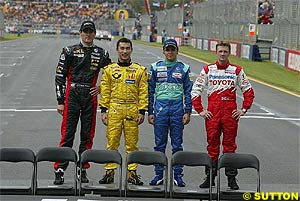 In Australia, at the beginning of March, four men saw their dreams come true when they lined up for their first Grand Prix, each with different expectations and different aspirations for the end of their opening attack on the Formula One scene.
In Australia, at the beginning of March, four men saw their dreams come true when they lined up for their first Grand Prix, each with different expectations and different aspirations for the end of their opening attack on the Formula One scene.
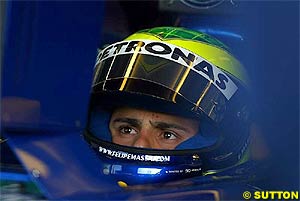 Massa's realistic but ambitious comments were said to keep his feet firmly on the ground amid rumours that he was the hottest driver to come out of Brazil since the late, great Ayrton Senna. Better than Raikkonen, it was claimed. Better than many of his rivals? Possibly. Sato was not so candid.
Massa's realistic but ambitious comments were said to keep his feet firmly on the ground amid rumours that he was the hottest driver to come out of Brazil since the late, great Ayrton Senna. Better than Raikkonen, it was claimed. Better than many of his rivals? Possibly. Sato was not so candid.
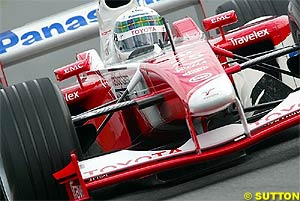 It is often said that the best test of ability is how a driver compares to his teammate, and at first glance that makes Webber the star of the season so far. He has outqualified, outraced and outscored his Malaysian teammate Alex Yoong in every one of Minardi's eight races (they missed the Spanish Grand Prix when Stoddart pulled the team out because they did not have time to investigate dangerous wing failures).
It is often said that the best test of ability is how a driver compares to his teammate, and at first glance that makes Webber the star of the season so far. He has outqualified, outraced and outscored his Malaysian teammate Alex Yoong in every one of Minardi's eight races (they missed the Spanish Grand Prix when Stoddart pulled the team out because they did not have time to investigate dangerous wing failures).
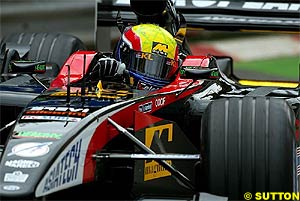 Not something that could be said of Brazilian Massa, whose Sauber squad are one of the teams at the head of the midfield pack. But, faced with a tough teammate in German Heidfeld, a McLaren protege who is now two years into his Formula One career, the young Brazilian has had his ups and downs but now has four points in the bag.
Not something that could be said of Brazilian Massa, whose Sauber squad are one of the teams at the head of the midfield pack. But, faced with a tough teammate in German Heidfeld, a McLaren protege who is now two years into his Formula One career, the young Brazilian has had his ups and downs but now has four points in the bag.
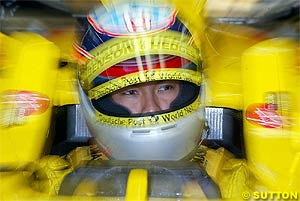 Massa was thought to be Ferrari-bound at the end of this season but those rumours were quashed when fellow Brazilian Rubens Barrichello re-signed for the outfit at the Austrian Grand Prix for another two years. But not even the weight of expectation developed by such highly predicted directions could dim the spirit of the smiling youngster. Did it put him off? "No," he said, matter-of-factly. "People were always asking and I always said it is not true, because it's not true."
Massa was thought to be Ferrari-bound at the end of this season but those rumours were quashed when fellow Brazilian Rubens Barrichello re-signed for the outfit at the Austrian Grand Prix for another two years. But not even the weight of expectation developed by such highly predicted directions could dim the spirit of the smiling youngster. Did it put him off? "No," he said, matter-of-factly. "People were always asking and I always said it is not true, because it's not true."
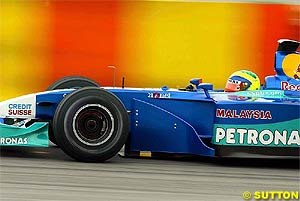 But the Jordan car is improving, and soon he may have a machine to match his apparent talent, as long as he can keep it out of the scenery. Insiders at the team believe he will remain there in 2003 but Jordan could be faced with a difficult decision if he is still erratic with a quarter of the races still to go.
But the Jordan car is improving, and soon he may have a machine to match his apparent talent, as long as he can keep it out of the scenery. Insiders at the team believe he will remain there in 2003 but Jordan could be faced with a difficult decision if he is still erratic with a quarter of the races still to go.
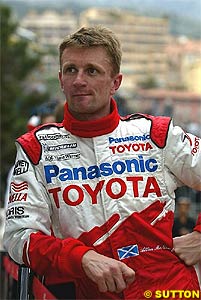 Will that be enough for McNish to keep his place? "That, I would not like to answer at this moment in time," replied Andersson. It all depends which drivers come knocking on Toyota's door at the Cologne factory in Germany as the dizzying driver merry-go-round begins to spin.
Will that be enough for McNish to keep his place? "That, I would not like to answer at this moment in time," replied Andersson. It all depends which drivers come knocking on Toyota's door at the Cologne factory in Germany as the dizzying driver merry-go-round begins to spin.
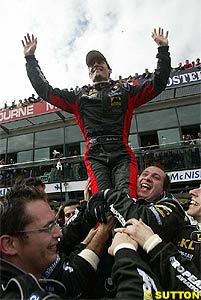 Andersson, too, believes that McNish has not been shown in the best light because of Toyota's failings. If they do not keep him on, his Grand Prix career could end up consisting of just 17 races. That would be a shame because not only is he a totally nice chap; he is, according to his team boss, as good as young sensation Massa.
Andersson, too, believes that McNish has not been shown in the best light because of Toyota's failings. If they do not keep him on, his Grand Prix career could end up consisting of just 17 races. That would be a shame because not only is he a totally nice chap; he is, according to his team boss, as good as young sensation Massa.
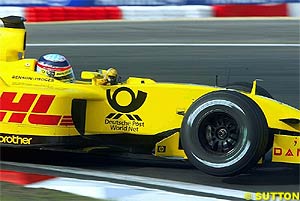 Drivers may be on track for just five hours of practice running over a Grand Prix weekend and, perhaps, another one and a half hours in the race, but they will be forced to work long into the night as they discuss their data with engineers.
Drivers may be on track for just five hours of practice running over a Grand Prix weekend and, perhaps, another one and a half hours in the race, but they will be forced to work long into the night as they discuss their data with engineers.
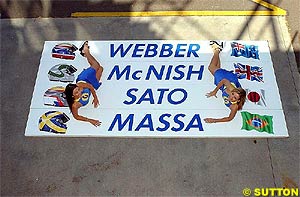 So, Sato believes, the 'learning circuits' excuse is no longer valid. "It doesn't matter what circuit we are on," said Sato. "The press say this about one place and something about another circuit but if you look at the San Marino Grand Prix it was my first time there and I was in very good shape.
So, Sato believes, the 'learning circuits' excuse is no longer valid. "It doesn't matter what circuit we are on," said Sato. "The press say this about one place and something about another circuit but if you look at the San Marino Grand Prix it was my first time there and I was in very good shape.
Please Contact Us for permission to republish this or any other material from Atlas F1.
|
Volume 8, Issue 26
Articles
2002 Rookie Review
Ann Bradshaw: View from the Paddock
Jo Ramirez: a Racing Man
European GP Review
European GP Review
European GP - Technical Review
The Rope, the Tree & the Prancing Horse
Audi: Out of it?
Stats Center
Qualifying Differentials
SuperStats
Charts Center
Columns
Season Strokes
Elsewhere in Racing
The Grapevine
> Homepage |